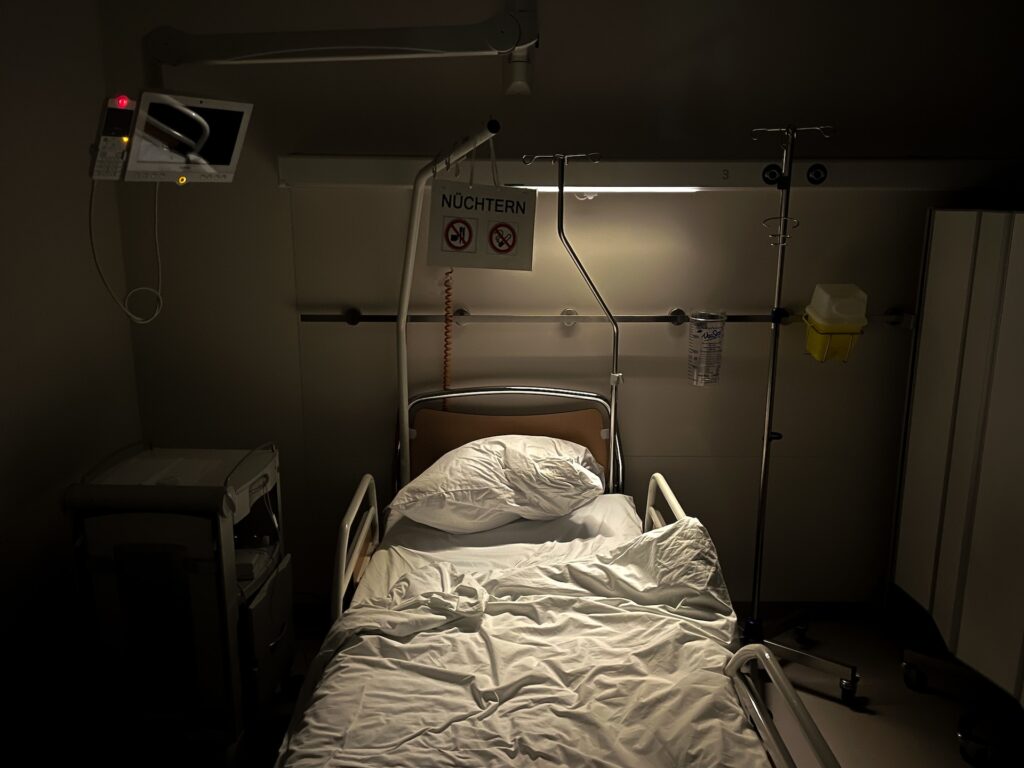Bedsore Lawyers

Hospital Bedsores: Understanding the Causes and Risks
Bedsores are caused when there is constant pressure against the body which lowers, limits or eliminates blood flow to the skin. Lack of blood flow results in a breakdown of the tissue which leads to skin damage and pressure sores. These sores are also called pressure ulcers or decubitus ulcers.
Bedsores or pressure ulcers can occur anywhere on the body but are most commonly found in areas where bone is close to the skin. Areas of concern for pressure ulcers include:
- Heels
- Ankles
- Behind the knees
- On the back or sides of the head
- Hips
- Tailbone
- Low back
- Elbows
- Buttocks
Any person who is bedridden, has limited mobility, or has a decreased pain sensation is at high risk of developing a pressure ulcer or bedsore. Additionally, people who are in a wheelchair, unconscious or are required to wear a cast for an extended period of time are also at a higher risk for developing a bedsore.
Some medical conditions can increase the risk of pressure ulcers. These conditions include but are not limited to:
- Diabetes
- Peripheral Vascular Disease
- Cancer
- Malnutrition
- Chronic Venous Insufficiency
- Dementia
- Heart Failure
- Kidney Failure
Hospital patients and individuals who are being cared for at an assisted living facility may have an increased risk of developing pressure ulcers due to inadequate staffing and lack of care by overworked health care providers and assisted living facility staff. Poor nutrition, lack of hydration and unsanitary conditions greatly increase the likelihood of a patient developing a pressure ulcer.
Stages of Bedsores
When blood flow is cut off from the skin, it only takes two to three hours for a bedsore to start to develop. If a pressure ulcer is not treated immediately, the condition quickly worsens. The symptoms of a bedsore are divided into four stages.
Stage One: The affected skin may be red or have a purple tinge and is warm to the touch. If the patient is able to verbalize, they may complain about a burning, itching or painful feeling.
Stage Two: The damaged skin may have a blister, a scrape or an open sore, and skin surrounding or adjacent may be discolored. Significant pain and discomfort may be expressed by the patient. If a patient has lowered or no pain sensitivity, they may be unaware of the pressure sore.
Stage Three: Continued damage has caused the bedsore to take on a crater-like appearance which is indicative of deterioration deepening beneath the skin’s surface.
Stage Four: The pressure ulcer is showing extensive damage to the skin tissue and may now involve bones, tendons, joints and muscles. There is a high likelihood of serious wound infection at this stage.
Left untreated, a pressure ulcer will continue to worsen and exceed the progression described in the four stages.
Complications Resulting From Pressure Sores, Bedsores, and Pressure Ulcers
Bedsores and pressure ulcers are distressing and extremely painful conditions for anyone to endure. Unfortunately, untreated or undertreated bedsores can also lead to extremely serious and even life-threatening medical conditions.
Cellulitis
Cellulitis is a painful skin infection that also affects the connected soft tissue. Symptoms of cellulitis include the area being warm to the touch, swelling, redness and inflammation. Untreated bedsore related cellulitis can lead to infection of the bloodstream, chronic swelling, tissue death.
Bone Infections
If a pressure ulcer penetrates into the bone, the resulting infection can damage the surrounding bones and joints. This can lead to loss of function of a limb and even amputation.
Cancer
A bedsore that doesn’t heal is called a Marjolin’s ulcer. This type of ulcer often develops into squamous cell carcinoma, a type of cancer.
Osteomyelitis
Osteomyelitis is a bone infection often caused when a bedsore is exposed to feces and urine. Osteomyelitis delays the healing of the bedsore and can lead to sepsis and death.
Septic Arthritis
When bacteria from a bedsore infects a joint it causes extremely painful redness and swelling. Complications from this infection can cause permanent damage to joints and further limit usage and mobility.
Bacteremia
Bacteremia, or bacteria in the bloodstream can be caused by bedsores and results in fever, chills, shaking, and if left untreated can lead to septic shock, organ failure, and death.
Necrotizing Fasciitis
Necrotizing fasciitis or “flesh-eating bacteria” is a very aggressive infection that causes tissue death and spreads rapidly. 25% of the people diagnosed with necrotizing fasciitis lose their life to the infection.
Prompt recognition, diagnosis and treatment of pressure ulcers gives the patient the greatest chance at recovery without long lasting effects. Failure to recognize and take appropriate measures to treat a bedsore can have disastrous consequences for the patient and their family.
Preventing Hospital Bedsores: Patients’ Rights and Hospital Obligations
When receiving treatment or care in a hospital or assisted living facility, the patient has certain rights that, if violated, may constitute abuse, neglect or medical malpractice. Having access to, and receiving good quality of care is one of these rights, along with being protected from abuse and neglect, being treated with dignity and respect, and being informed of his or her health status. Additionally, a patient has the right to clean and sanitary living conditions and access to quality nutrition and hydration.
A patient in a hospital or resident of a care center has a right to quality care that prevents painful and dangerous bedsores. This care may include but is not limited to:
- Turning or repositioning a patient every 2 hours
- Help in maintaining an upright position while in a wheelchair and adjusting every 15 minutes
- Soft padding on wheelchairs and beds
- Maintaining clean and dry skin
- Providing good nutrition and hydration
A healthcare facility has certain legal obligations in regards to patient care, and this is true whether it be a hospital, rehabilitation center, or assisted living facility. These obligations are often referred to as “a legal duty to care”.
A hospital or assisted living center’s duty to care means that they must provide the accepted standard of care to all of their patients or residents. Failure to do so may make a hospital liable for any damages that a patient may suffer as a result.
Hospital acquired bedsores and pressure ulcers are often the result of neglect by hospital and care center staff. Bedsore lawyers can help patients and their families recover compensation for damages caused by bedsores by filing a claim for damages or filing a bedsore lawsuit.
How To Advocate For Proper Care In a Hospital Or Assisted Living Facility
Placing a loved one or family member in the care of strangers, whether that be a care home or a hospital stay, can be incredibly stressful. The amount of trust we place in healthcare facilities and healthcare workers is immense. Luckily, most of the time our trust is well-placed and our family members receive excellent care. Unfortunately, there are situations where proper care is not received.
Patients in a hospital or other healthcare facility are often too sick or limited to advocate for their own care. It is critical that the family stays involved to ensure the best outcome possible and prevent neglect or abuse.
Family members can advocate for their loved one in the following ways:
- Make frequent visits at various days and times
- Make note of any changes in your loved one’s behavior that may indicate something is wrong. Are they more subdued than normal? Withdrawn?
- Ask about any discomfort or pain. Patients may be reluctant to tell staff because they don’t want to cause trouble.
- Check loved one for bruises, bedsores, nicks or cuts
- Take note of personal hygiene issues, especially if the patient is incontinent. If your visits always seem to coincide when staff was just about to change a brief, but hadn’t yet. It could be a sign that your loved one is being neglected.
- Learn the names of nurses and staff who are caring for your loved one. Inquire often about your loved one’s care and make sure that your contact information is available in case something needs to be addressed.
- Report anything that is concerning to the appropriate medical staff so that it can be addressed and remedied.
Not all bedsores are caused by neglect, sometimes a severe underlying condition, such as peripheral vascular disease, or advanced diabetes can make avoiding a pressure ulcer incredibly challenging. However, for most patients, pressure sores that occur in a hospital or assisted living facility are 100% preventable and the presence of pressure sores indicate that something has gone wrong.
Hospital Bedsores: When to Seek Legal Help for Your Loved Ones
If your loved one has developed a bedsore while in the care of a hospital or other medical facility you have a right to be concerned. Pressure ulcers indicate that a patient is not being repositioned often enough, is on a surface that doesn’t have enough cushion, has not been kept clean and dry or any number of other factors.
If you notice, or the facility notices the beginnings of a pressure sore and steps are taken to halt its advancement and prevent further problems, contacting a bedsores lawyer is not likely to be in you or your loved one’s best interest.
If, however, a bedsore has been seen and not treated, or if a bedsore isn’t found until it has already progressed past stage one, it’s time to take action.
If you believe your loved one is being neglected due to the presence of pressure ulcers, the most pressing need is to make sure your loved one is moved to a safe environment where the bedsores are treated. This may mean getting a second opinion and a new doctor to oversee care, moving your loved one to a different hospital, or finding placement in a new care facility.
As soon as your loved one is safe and their immediate health concerns are being properly addressed. It is in your best interest to contact a bedsores lawyer as soon as possible. The pain and suffering a bedsores patient endures due to someone else’s negligence is unjust and should be compensated for, as well as any other expenses related to the neglect.
Hospital Bedsores: Are You a Victim of Medical Malpractice?
With the advances in medical devices, including programmable beds, stretchers and wheelchairs, it has never been easier for medical staff to properly care for patients and avoid pressure ulcers. When a pressure ulcer does occur, it may be a form of medical malpractice.
Medical Malpractice
Medical malpractice is a term that refers to a legal case involving misdeeds, mistakes, deviations from standard practice, or a negligent act or omission committed by a caregiver in the healthcare industry.
Medical malpractice is based on the theory of negligence. You are a victim of medical malpractice if the following situation applies to your case.
- The caregiver had a professional duty of care in regards to your patient status.
- The caregiver failed to fulfill their obligation and provided care that was below the accepted standards.
- You were harmed by the substandard care.
- You suffered real damages as a result of the harm you were caused.
If you have suffered damages due to a bedsore that occurred as a result of medical malpractice, contact a bedsores lawyer as soon as possible. Medical malpractice lawsuits can be complicated and time sensitive.
Consulting an attorney about your case in a timely manner can help you avoid problems with individual state laws regarding time-limits for filing. These time limits, called statutes of limitations, impose a limited window of time when a victim of medical malpractice can file a claim.
Additionally, the sooner a lawyer starts working on your hospital bedsores case, the easier it will be to locate witnesses, obtain evidence of negligence and build a successful case.
Your Guide to Filing a Hospital Bedsores Lawsuit: Steps to Take
If you or a loved one developed a bedsore while in the care of a hospital or assisted living facility you deserve compensation for your losses. However, the process of filing a claim and suing the medical establishment can be overwhelming and feel like it’s more than you can handle.
The following is a simple, easy to follow, step by step guide to help you navigate filing a hospital bed sores lawsuit.
- Contact a well-established, experienced bedsores lawyer and schedule a consultation. This initial consultation will give you a chance to get to know your legal team, ask questions about your case and the legal process. The more details you can provide about your case to your legal team at this consultation, the more clarity you will have about what you can expect moving forward.
- Sign authorizations so that your bedsores lawyer can have access to your medical records to use as evidence of neglect and proof that an injury did occur.
- Provide names and contact information for any witnesses you may have to testify about your situation.
- Gather medical bills, statements, receipts and any other documentation proving your financial losses.
Your legal team will conduct an in-house investigation, gather evidence, file paperwork, select expert witnesses and do all that is required to prove negligence in your case.
If there is a settlement offer, your bedsores lawyer will review it to ensure it is fair and reasonable and then present it to you for approval. If it is in your best interest, you can accept the offer, continue to negotiate or proceed to court.
If you proceed to court, your legal team will argue your case, present evidence to the judge and or jury and then a verdict will be announced and finalized.
The Role of Expert Witnesses in a Hospital Bed Sores Lawsuit
Having expert witnesses from the medical field testify and provide statements as to certain facts of your case can make all the difference. Expert witness testimony carries a lot of weight and increases the credibility of your case and the evidence.
Medical experts include professionals such as physicians, surgeons, and nurses who are expertly skilled, have an impeccable record and have years of experience in their field.
A medical expert can help your case bedsores case in the follow ways:
- Examine the facts of your case.
- Make written statements and reports concerning the evidence and what it demonstrates.
- Use models, photographs, video and other visual aids to present information regarding pressure sores, how they are formed and the damage they can do.
- Testify to the standard of care that should have been in place and how your care fell short of that standard.
Your bedsore lawyers will be able to enlist the help of medical experts that can testify and provide evidence that the injury you suffered was caused by negligence. Holding the responsible party accountable for their actions can help prevent further wrongdoing.
Legal Challenges to Proving Negligence In Your Hospital Bedsores Case
When filing a lawsuit for medical malpractice pertaining to hospital bedsores it is important that individuals and family members be prepared for the fight ahead. The medical establishment is big business, and as such, it has the resources and motivation to defend itself against any claim of negligence.
Legal challenges to proving negligence may include:
- Statements that the injured patient refused attempts at repositioning and treating bedsores.
- That the pressure ulcers were a preexisting condition.
- That the standard of care was met, the patient just did not respond.
- That an underlying health problem made pressure ulcers unavoidable.
An experienced bedsore lawyer will be able to dispute any legal challenges the opposition may propose and prove negligence by first, demonstrating that the medical staff had a duty to care. Secondly, that they breached that duty. Third, that their failed duty led to injury, and lastly, that the injury led to real physical and financial damages.
Hospital Bedsores and Wrongful Death: Seeking Justice for a Loved one
It is heartbreaking to lose a loved one under any circumstances, but when the loss is due to medical negligence, it is especially tragic. Seeking justice for the preventable loss of a loved one is important not only to help survivors heal, but to prevent other patients from becoming victims.
A wrongful death lawsuit is different from a medical malpractice claim in two distinct ways. Who is filing the claim and what damages can be sought.
A wrongful death lawsuit is filed by survivors of the deceased. Each state has rules regulating who can file a wrongful death claim and in which order if there are multiple claimants. Generally, the people eligible to file a claim include:
- Spouse
- Children
- Parents
- Next-of-kin
- An appointed personal representative, trustee or beneficiary
Damages that can be sought in a bedsore wrongful death claim include all applicable damages if the patient had lived, such as medical bills, lost wages, and pain and suffering compensation. In addition to these damages, the surviving family may also be awarded:
Loss of emotional support or companionship Loss of instruction and guidance (for surviving children) Loss of financial support Lost inheritance Funeral and burial expenses
In cases where the neglect was found to be extreme and with a disregard for life, punitive damages may be awarded by a judge or jury.
Bedsore lawyers understand that no amount of financial settlement can compensate for the loss of a loved one, but a fair settlement can ease the financial burden placed on survivors and bring peace of mind knowing justice was served.
Personal Injury Law Firm Helps Bedsore Victims
Gordon & Partners is a Florida personal injury law firm dedicated to helping bedsore victims recover maximum compensation for their losses. Our attorneys fight for the rights of injured victims and stand up to powerful insurance companies and corporations. For a free consultation Call 1-855-722-2552.
Free Case Evaluation
Verdicts & Settlements
Jury verdict for the wrongful death of a 63-year-old man survived by his widow.
Jury verdict for the wrongful death of a 97-year-old woman at an ALF.
Recovery for family of infant killed during bath at babysitter’s home.
Related News
- Preventing Bedsores: How Patients and Families Can Advocate for Better Care
- Frequently Asked Questions About Bedsores Lawsuits
- Choosing the Right Bedsores Lawyer: Factors to Consider
- Statute of Limitations for Bedsores Lawsuits: Don’t Miss Your Chance for Justice
- Compensation for Bedsorefs: What Victims and Families Should Know
- Legal Remedies for Nursing Home Abuse in Florida



